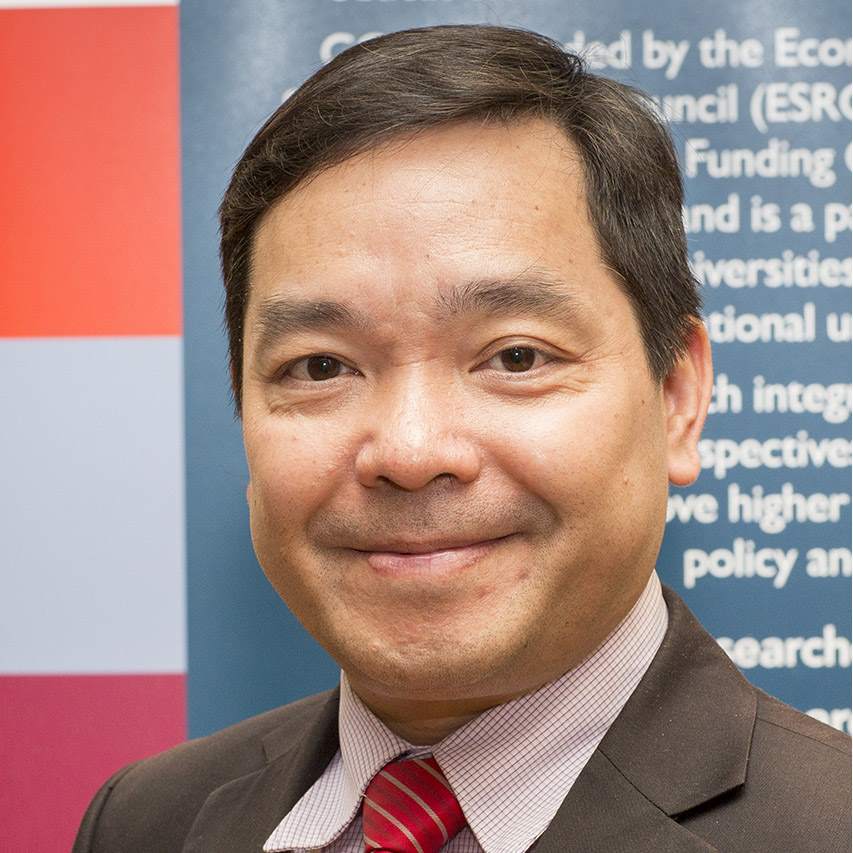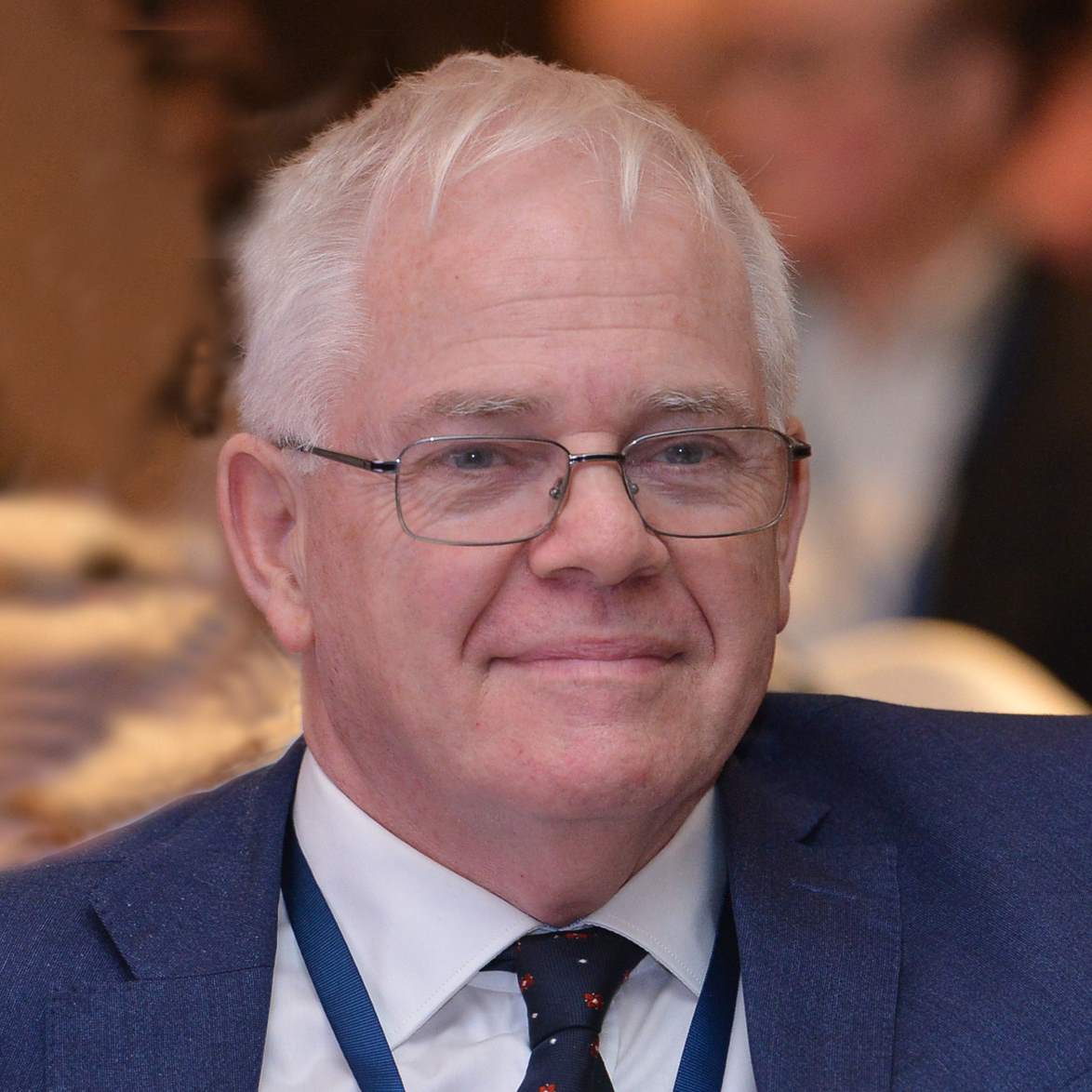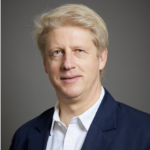Tristan McCowan is Professor of International Education at the Institute of Education, University College London. His work focuses on higher education in the international context, including issues of access, curriculum, alternative models and sustainability. His CGHE Project 9 explored the supranational space in higher education – the ways in which this space is formed and developed above or beyond nation-states, the actors that form this space, and the resource and knowledge flows within this space, and between the national, regional, and supranational spaces.
Alis is Professor of Philosophy of Education and Research Policy at the University of Oxford, where she has also been Director of Research in the Department of Education. Her interests are in research on research and philosophy of research. Her research has focused on research policy and governance, research assessment and evaluation, incentives and criteria for worthwhile research (including openness, quality, impacts), methodological theory and research capacity building; higher education policy and reform, including the reform of teacher education in international contexts; and empirical, theoretical and philosophical exploration of different modes of research.
Lee Rensimer is a Lecturer in Education Studies at IOE, UCL’s Faculty of Education and Society and a Deputy Director of CGHE. He was previously a Research Associate on CGHE Project 9, ‘Mapping supranational higher education space’, and continues to work with the co-investigators of that project on the geopolitics of regional higher education spaces.
Xin Xu (许心) is a Departmental Lecturer in Higher/Tertiary Education at the University of Oxford. Her research concentrates on higher/tertiary education and research.
Hannah Moscovitz is Postdoctoral Research Fellow at the Danish School of Education, Aarhus University. Hannah’s research is focused on the territorial politics of higher education, touching on themes related to regionalism, minority nationalism and federalism and their intersection with higher education policy and governance.
Vincent Carpentier is a Professor of Higher Education and Society at IOE, UCL’s Faculty of Education and Society. He was responsible for CGHE Project 7, ‘A historical lens on higher education staffing: UK and France’. Key outcomes from this project included papers such as Three Stories of Institutional Differentiation: Resource, Mission and Social Inequalities in Higher Education (Policy Reviews in Higher Education 2021) and Academic Workforce in France and the UK in Historical Perspectives (Comparative Education 2023- with Emmanuelle Picard), recently reported in the Conversation (2023) . He was also a Co-Investigator on Project 8, ‘Local and global public good of higher education: 10 nation study’ examining the French context presented in the paper Public Good in French Universities: Principles and practices of the “Republican” Model of Higher education (Compare 2022- with Aline Courtois).
Mário Azevedo is a Professor at the State University of Maringá (Paraná, Brazil), where his research focusses on public education policies and the internationalization of higher education. He was previously a member of the board of the National Association of Graduate Studies and Research in Education (ANPEd – Brazil). He currently participates in the Higher Education Research Network ‘Universitas/BR’ (Brazil), and is a researcher at the National Council for Scientific and Technological Development (CNPq).
Thandi Lewin is a CGHE Deputy Director and an Associate Professor at the Ali Mazrui Centre for Higher Education Studies, in the Faculty of Education at the University of Johannesburg. She has come into academia relatively late, following a career as a civil servant.
Chris Millward is Professor of Practice in Education Policy at the University of Birmingham where he leads a group of researchers working on educational equity in policy and practice. He is a Deputy Director of CGHE .
Taugul born and London based,
Olga Mun is a co-convenor of the Climate Change Education Reading Group at the Department of Education at the University of Oxford. Olga’s main research interest is in the topics of epistemic injustice across all levels of education and the reparative ways to address them. Her doctoral project at Oxford University is looking at environmental education in Central Asian and global higher education with a focus on what glaciers and steppe tulips can teach about climate change and sustainability. Prior to joining Oxford, Olga taught at University College London Institute of Education in London on the topics of migrant, refugee and minority education and European education traditions from a comparative lens.
David Mills is Director of the Centre for Global Higher Education. His current research interests include the political economy of academic research and publishing in Africa. His most recent book is ‘
Who Counts: Ghanaian Academic Publishing and Global Science’, co-written with colleagues from the University of Ghana and Oxford.

Professor Ka Ho Mok, Joshua is currently Provost and Vice President (Academic & Research) of the Hang Seng University of Hong Kong (HSUHK). Before joining HSUHK, he was the Vice President and Chair Professor of Lingnan University, Hong Kong. Since the inception of CGHE, Professor has worked closely with colleagues of the centre for promoting higher education research with focus on Asian education and development studies. He is also a Deputy Director of CGHE. Before joining Lingnan, he was the Vice President (Research and Development) and Chair Professor of Comparative Policy of The Education University of Hong Kong, and the Associate Dean and Professor of Social Policy, Faculty of Social Sciences of The University of Hong Kong. Prior to this, Professor Mok was appointed as the Founding Chair Professor in East Asian Studies and established the Centre for East Asian Studies at the University of Bristol, United Kingdom. Ka Ho Mok led CGHE Project 10, ‘
UK international graduates in mass media and public perceptions: A comparative study of the UK, Mainland China, Hong Kong and Taiwan’.

Simon Marginson is Professor of Higher Education at the University of Oxford, founding Director of the ESRC/RE Centre for Global Higher Education (CGHE), Joint Editor-in-Chief of Higher Education, and a Professorial Associate with the University of Melbourne. Simon’s research is focused primarily on global and international higher education, the global science system, higher education in East Asia, the contributions of higher education, and higher education and social inequality. Simon led CGHE’s project 8 which investigated the public good role of higher education in ten countries. The project found that while a broad notion of public good has been largely emptied out of policy in the English-speaking countries, where economic definitions of individualised pecuniary value are dominant, recognition of the broader individual and collective outcomes of higher education continues in different ways in other jurisdictions including France, Finland, South Korea and China. The study in England discovered however that despite the narrow economic framing used by Westminster policy makers, both higher education practitioners and policy professionals believe that higher education makes a large and multiple contribution to both national and global public goods.
Antonin Charret is a Research Assistant on Project 3 for the Centre for Global Higher Education and a Doctoral Teaching Fellow at the Department of Education, University of Oxford.
Annette Bamberger is a Senior Lecturer in the Faculty of Education at Bar-Ilan University, where she leads the Higher Education Track in the MA Leadership, Organizational Development, and Policy program. She is also an Honorary Research Fellow at the UCL Institute of Education. Her research advances critical analyses of higher education politics, policy, and practice, with a particular focus on internationalization and state-diaspora relations.
Susan L. Robertson is Professor of Sociology of Education at the University of Manchester, Bye-Fellow at Wolfson College, Cambridge, and Distinguished Visiting Professor at Aarhus University, Denmark. She has written extensively on transformations of the state, multi-scalar politics, global and regional processes, and higher education. Susan is founding, and current editor of Globalisation, Societies and Education.
Hans Schildermans is a Senior Research Fellow at the Department of Education of University of Vienna. He is currently working on a project about conceptualisations of the future of the university and its social role. Hans is interested in the politics of higher education, critical university studies and the intellectual history of educational reasoning.
Dr Ahmad Akkad (PhD, Warwick) is a postdoctoral researcher at the University of Oxford, leading the Middle East and North Africa component of the International Student Mobility and World Development project. He also serves as a College Advisor at Blackfriars College, Oxford, and is an Associate Editor (ECR) at Higher Education Quarterly.
Dr Natalya Hanley is a postdoctoral researcher working on the International Student Mobility and World Development project at the University of Oxford. Her PhD research (UCL) investigated the contribution of Empathy-based pedagogy in Global Citizenship Education. Her research interests include the following areas: global and development education, critical pedagogy, and education within conflict-affected contexts.
Joonghyun Kwak is a postdoctoral researcher at the University of Oxford, where he leads the quantitative component of the International Student Mobility and World Development project. His research focuses on globalisation, social stratification and inequality, sustainable development, and quantitative methods.
Dr. Zhe Wang (DPhil Oxford) is a postdoctoral researcher at Oxford, focusing on international student mobility and development in East Asia, the Pacific, and South Asia. Her interdisciplinary work explores higher education, transnational migration, socio-spatial inequality and inclusive development. She has published widely and serves in editorial and advisory roles.
Ying is a postdoctoral fellow at the Education University of Hong Kong, an Honorary Research Associate at the University of Manchester, and a WG2 Co-stakeholder Advisor of COST Action ENIS Network. Her research interests include education agents, access to international higher education, international student recruitment and application, and longitudinal qualitative research methods.
Sazana Jayadeva is a Surrey Future Fellow in the Department of Sociology at the University of Surrey. Sazana is an Associate Editor of the journal Sociology and co-convenes the International Research and Researchers’ Network of the Society for Research into Higher Education in the UK.
Dr Cora Lingling Xu (PhD, Cambridge, FHEA) is Associate Professor at Durham University, UK. She is an executive editor of British Journal of Sociology of Education and an editorial board member of multiple international journals, such as Cambridge Journal of Education and Critical Studies in Education.
Catherine Gomes is a Professor in the School of Media and Communication at RMIT University in Melbourne. She is known for her work in the three interrelated areas of communication, culture and identity, international student wellbeing, and transient migrants. Her latest book International Student Visibility: Living and Participating in Community is open access.
Sylvie Lomer is Senior Lecturer in Policy and Practice at the University of Manchester. She graduated 2016 with Education Doctorate from the University of Sheffield. She’s been a teacher of international students for 8 years. She’s also a Fellow of the Higher Education Academy. Recent book: Research with International Students.
Jing Yu, PhD, is an assistant professor of international higher education in the Department of Educational Leadership and Policy Analysis and a faculty affiliate in Asian American studies at University of Wisconsin-Madison. Her research interests include international student mobility, intersections of race, class, and nationality, and international dimensions of equity, diversity, inclusion, and belonging.
Dr Diotima Chattoraj is a Research Fellow at the Wee Kim Wee School of Communication and Information in Nanyang Technological University. Additionally, she is an Adjunct Research Fellow at the department of Social and Health Sciences in James Cook University, Singapore. A qualitative researcher, she focuses on Asian migration, international relations, consumer psychology and advertising effects. She has authored more than 25 journal articles, 6 books, 10 book chapters in leading journals. Additionally, she is the Deputy Editor of South Asia Research (Sage) and serves as a peer reviewer for a number of refereed journals.
Jingran Yu is an assistant professor at the Institute of Education, Xiamen University (China), and an honorary research associate at the University of Manchester. She holds a PhD in Sociology from the University of Manchester. Her research focuses on global educational mobilities (including international student mobility and transnational education), approached through interdisciplinary lenses across educational studies, sociology, and human geography. Her recent research is centred on China’s transnational education and technical assistance along Belt and Road countries, particularly in Malaysia and Laos. Her PhD research, titled ‘Imaginative Travellers In-situ: A Case Study of Chinese Students at a UK Transnational Higher Education Institution’ was awarded the BERA Doctoral Thesis Award (2021).
Dr Miguel Antonio Lim is senior lecturer and REF lead at the Manchester Institute of Education, University of Manchester. He is lead researcher for the intra-ASEAN scholarship programme of the ASEAN secretariat.
Wanwei Nie is a doctoral candidate at University College London (UCL). Her research interests include international and comparative education, student experiences, and historical research.
Uma Pradhan is an Associate Professor at the Institute of Education, University College London, UK. Her research explores the intersection of language, education, and aspirations in South Asia. She has co-edited Anthropological Perspectives on Education in Nepal: Educational Transformations and Avenues of Learning (Oxford University Press) and authored Simultaneous Identities: Language, Education, and the Nepali Nation (Cambridge University Press). She also serves as a co-editor of the journal Compare.
Johanna Waters is Professor of Human Geography at University College London and co-Director of the Migration Research Unit. She is visiting Fellow at Kellogg College, University of Oxford and an elected Fellow of the Learned Society of Wales. Johanna works on issues related to migration, mobilities and education, with a particular focus on why children and young people seek educational opportunities abroad, and with what consequences (especially for the household). Her latest book (with Rachel Brooks) is entitled Student Mobilities and Migration and will be published by Palgrave in 2021.
Peidong Yang is an Associate Professor at the National Institute of Education (NIE), Nanyang Technological University (NTU), Singapore. He received a DPhil in Education from the University of Oxford, and his research focuses on the intersections of education and migration/mobility, especially international student mobility. For details, please visit www.peidongyang.com
Anding Shi is a DPhil student at the Department of Education at the University of Oxford. Her doctoral thesis focuses on the impact of publication evaluation and publication culture on China’s doctoral education and social science research. The research is fully funded by the China Scholarship Council. She also has a strong interest in doctoral development and academic profession.
Qiongli Zhu is a PhD candidate in the Ontario Institute for Studies in Education at the University of Toronto. She is also an Associate Professor at Hainan University, China, currently on temporary leave to pursue her degree in Canada. Her research centres on doctoral students’ career planning and preparation, teacher professional development, and qualitative research methodologies. Qiongli’s doctoral thesis explores PhD student agency in career thinking and actions within the contexts of Canada and mainland China.
Hatice Nuriler is a PhD fellow at the Danish School of Education, Aarhus University. She has a background in the humanities and her PhD research explores societal impact of humanities doctoral education in the Danish context. Hatice’s interests include philosophy of higher education, existential philosophy and the ethnographic method.
Zheng Zou is currently a Doctor of Education (EdD) candidate at the National Institute of Education, Nanyang Technological University, Singapore. She is an experienced international education practitioner with extensive experience in international collaboration institutions. She currently manages programs at the Stanford Center at Peking University.
Maher Hashweh is a retired professor of education at the Department of Curriculum and Teaching at Birzeit University, Palestine, and the previous Dean of the Faculty of Education. Prof. Hashweh has published in the areas of science education, democracy education, teacher knowledge and teacher professional development, case-based pedagogy, research ethics, and decolonizing knowledge production.
Anoud Abusalim is a senior instructor at the American University of Sharjah. After finishing her PhD in Educational Research from Lancaster University, her research is focused on the different aspects that influence and shape knowledge production and dissemination. Her research examines research writing and publishing practices and decoloniality labor in the global South.
Maya Aghasi is Associate Professor of English at the American University of Sharjah. She received her PhD in comparative literature from the University of Wisconsin-Madison, and has since been researching and publishing on Arab-American writers, world literature, and Lebanese literature and film. She is interested in how gender, exile and displacement, race, language, and the environment intersect to produce identity and a sense of community.
Lamma Mansour received her DPhil and her MPhil at the University of Oxford in the Department of Social Policy and Intervention as a Rhodes Scholar, and her BSc in psychology at the University of Haifa. Her research focuses on different aspects of the life of the Palestinian society inside Israel and its relationship with the state.
Hanne Tange is Associate Professor in English and Global Studies at Aalborg University. She researches the practices of international and intercultural education, including the impact of multilingualism, multiculturalism, and interdisciplinarity on learning environments. In 2021 Dr Tange published the monograph Teaching practices in international HE (Routledge).
Kirsten Jæger is Associate Professor at Aalborg University. Her primary research fields are higher education policy and problem-based learning in higher education with a specific focus on interdisciplinarity and intercultural learning. Dr Jæger is affiliated with the Aalborg Institute for Problem-Based Learning.
Vedika Kedia is a DPhil student at the Department of Education in Oxford. Drawing from her
first-hand study experience at six renowned universities in different geographies, Vedika aims
to create a diversified understanding of higher education, research and knowledge production.
She is a graduate from Lady Shri Ram College for Women, New Delhi and pursued Master
programmes at Peking University and University of Oxford respectively. She has further
studied at National University of Singapore, King’s College London and Sciences Po, Paris.
Roxana Chiappa, PhD, is an Assistant professor at the University of Tarapacá (Chile) and an associated researcher at Rhodes University (South Africa). Her research agenda analyses how inequalities get reproduced in higher education and scientific systems among countries, institutions and social groups.
Jhuliane Evelyn da Silva, PhD, is an Assistant Professor at the Federal University of Ouro Preto (UFOP). Informed by critical and decolonial scholarships, her research analyzes the complex roles education and language education are called to serve in neoliberal times, and gestures towards ways of thinking, relating and being otherwise.
Juliana Zeggio Martinez is a tenured Professor of English at Universidade Federal do Paraná, Brazil. She holds a Ph.D in Applied Linguistics from Universidade de São Paulo with a doctoral internship at the University of British Columbia. Her interests lie in critical applied linguistics, teacher education, internationalization of Higher Education, decoloniality, and epistemologies of the south.
Hiba Ibrahim is a PhD Candidate in applied linguistics at York University n Canada. She is finishing her dissertation on exploring interculturality and intercultural learning experiences of university students in lingua franca virtual exchange. Her research interests are telecollaboration and virtual exchange; culture, language, and identify; intercultural competence in additional language learning.
Francesca Helm is associate professor of English at the Department of Political Science, Law and International Studies at the University of Padova. Her research interests include (de)coloniality in language education and edtech, language policy, linguistic landscapes, interculturality and critical internationalisation studies.
Francesca Dell’Olio holds a PhD in Humanities from the University of São Paulo. Her research interests encompass include the examination of identity formation within the language education process, particularly in migrant contexts. She also conducts research on interculturality, linguistic, social, and educational policies and practices, as well as decolonial and postcolonial studies.
Dr Abass B. Isiaka is a Research Associate in Widening Participation at the Centre for Higher Education Research Practice Policy and Scholarship (CHERPPS) at the University of East Anglia, Norwich, United Kingdom. He is interested in the sociology of inequalities, policy research and evaluation, internationalisation, disability and institutional ethnography.
Yann Lebeau is Professor of Higher Education Research and Head of the School of Education and Lifelong Learning, University of East Anglia. His research interest is on the interface between higher education and international development. He is particularly interested in the impact of international policy transfers, internationalisation, and academic mobility on national HE landscapes.

Dr Gardiana Bandeira Melo is a postdoctoral researcher in the Department of Education at the University of Oxford. She leads research on Africa in the International Student Mobility and World Development project exploring the impact of exchange programmes and policy development in education in addressing social and economic inequalities.
She has been awarded a PhD in Critical Development Studies from Cardiff Metropolitan University and holds MSc and BSc degrees in Economics from Sorbonne University. Her doctoral research examined the mechanisms through which capitalism and neoliberal policies are legitimised via infrastructure development and their resulting implications.
Her current work is centred on African Indigenous Knowledge Systems (AiKS), decolonial education and climate justice. It investigates how traditional knowledge informs equitable and sustainable development strategies, contributing to decolonial approaches in global education and challenging dominant paradigms in socio-economic and environmental governance.
Ariane de Gayardon is Assistant Professor at the Center for Higher Education Policy Studies (CHEPS) at the University of Twente in the Netherlands. Her research focuses on the financing of higher education internationally and its interaction with equity, including topics such as free higher education and student debt.
Dr. Shibao Guo is Professor at the Werklund School of Education, University of Calgary, Canada. He is also Honorary Professor of the University of Nottingham. Over the past twenty years as a transnational academic and scholar, Dr. Guo has developed research expertise in the areas of transnational migration, diaspora studies, internationalisation of higher education, international student mobility, and comparative and international education. He has numerous publications including books, journal articles, and book chapters. His latest book is: Reimagining Chinese Diasporas in a Transnational World (Routledge, 2024). He is former president of the Comparative and International Education Society of Canada. Currently he is co-editor of Canadian Ethnic Studies. He edits two book series for Brill Publishers: Transnational Migration and Education, and Spotlight on China.
Víctor Orellana Calderón is Undersecretary of Higher Education. He is a sociologist from the University of Chile. He has served as director of the Nodo XXI Foundation and researcher at the Center for Advanced Research in Education at the University of Chile. In addition, he has been a consultant for the Inter-American Development Bank (IDB) and the International Labor Organization (ILO). His lines of research are the sociology of education and education and social structure. He is a member of Comunes.
Dr. Bright Nkrumah is a Lecturer of Chinese at the Department of Modern Languages and Culture , Baylor University, Texas USA. He holds a B.A Degree in Chinese Language and Literature from Xian-Yang Normal University (Shaanxi - China), M.A in Teaching Chinese to Speakers of Other Languages from Xi’an International Studies University (Shaanxi - China), and a Ph.D. in Chinese Linguistics from Northwest University (Shaanxi - China). His research interests are Teaching/learning of Chinese as a Second/Foreign Language, Teaching/learning of Chinese modern characters, Acquisition of Chinese Characters, and Teaching/learning of Chinese language in Africa Higher Education and Africa-China Relations.
Si-yuan Li holds an MA and PhD from the University of Leeds and lectures in International Studies at Northwest University, China. His research focuses on China-Africa relations, International and Comparative Education, and China’s international language policies. He has published articles in The Pacific Review, Journal of Asian and African Studies, Research in Comparative and International Education, and International Journal of Comparative Education and Development.
Benjamin Mulvey is a lecturer in the School of Education at the University of Glasgow. His work is interdisciplinary, and has been published in journals across the fields of education studies, sociology, and geography. These include Higher Education, Sociology, Journal of Ethnic and Migration Studies, and British Journal of Sociology of Education, among others. He has published extensively on international student mobility between Africa and China, and is also interested in issues of academic freedom in the Chinese context.
Kenneth King is an Emeritus Professor of the University of Edinburgh. He was based in and directed its Centre of African Studies for many years and lectured on international perspectives in education and training in its School of Education. His research interests have addressed the politics and planning of skills development, including in the informal sector of the economy, aid policies towards education of both Western and Asian donors (including China, India and Japan), and higher education cooperation.
Alina Felder-Stindt is a postdoctoral researcher at the School of Economics and Political Science at the University of St. Gallen, Switzerland. Her research interests include the making of (EU) public policy and the mechanisms of Europeanisation. She is a Steering Group member of the European Consortium for Political Research (ECPR) Standing Group on “Knowledge Politics and Policies”.
Daniela Craciun is an Assistant Professor of Higher Education Policy at the University of Twente, the Center for Higher Education Policy Studies (CHEPS). Before that, she was a lecturer at Bard College Berlin and a tutor and academic advisor in the OLIve Refugee Education Initiatives (Germany). During her Ph.D. at Central European University (Hungary), she was also visiting scholar in Myanmar, Brazil, and USA.
Nadia Manzoni is a PhD candidate in Public Policy at the Doctoral School of Political Science, International Relations and Public Policy at the Central European University. She researches the dynamics of Europeanisation in the area of higher education on the case of the European Universities Initiative. She entered academia having worked for nearly 10 years as a policy officer and most recently, as a team leader for the Erasmus+ programme in higher education, in the European Commission's Directorate Generale for Education, Youth, Sport and Culture. Her educational background is in Education studies (University of Cambridge) and European studies (University of Vienna).
Agata A. Lambrechts holds a PhD in Education from the University of York, UK. She is currently a senior researcher at the Swiss Federal University for Vocational Education and Training (SFUVET), Switzerland and a scientific collaborator at the Institute of Communication and Public Policy at the Univerità della Svizzera italiana (USI), Switzerland. At SFUVET Agata focuses on a Swiss National Science Foundation-funded research project on collaborations within the European education, with focus on the European Universities initiative and its counterpart in the vocational education world - the initiative on Centres of Vocational Excellence. At USI, she focuses on research policy and higher education studies using both organisational and sociological perspectives to address topics such as the diversity of higher education institutions in Europe, the development of internationalisation over time and institutional collaboration, in particular, in the framework of the EUI.
Dr Rita Hordósy is a sociologist whose research interests revolve around social justice issues in education and post-compulsory education trajectories. Her current work focuses on the research/teaching nexus compared across European universities. She also leads on a research project exploring knowledge production in higher education journals.
Dr Martin Myers is a sociologist interested in the lives and identities of marginalised communities. His research explores the impact of race/racism and social class in different educational contexts including higher education and homeschooling. His recent book with Kalwant Bhopal entitled ‘Elite Universities and the Making of Privilege: Exploring Race and Class in Global Educational Economies’ was the 2024 BERA Educational Research Book of the Year.
Elizabeth Brown is a Postgraduate Research Student at the University of Nottingham, examining higher education admissions processes. She is interested in the intersection between sociology and education; particularly, how social configurations influence the accumulation of resources when engaging with education.
Maria Antonieta Vega Castillo is a Postgraduate Research Student at the University of Nottingham. Her thesis is on teacher’s self-efficacy and collective efficacy in Chilean public schools. Her research interest includes research methodologies, public policy analysis, social network analysis and agent-based modelling.
Lingxuan Chen (陈泠璇) is a doctoral student at the Department of Education, University of Oxford, and a Research Assistant on the Centre for Global Higher Education ‘Research on Research’ project. Her research interests include global epistemic injustice and the endogenous agendas of social science research.
Nicola is a Reader in Education for Sustainable Futures at Canterbury Christ Church University. A geographer by background, her research interests are focused on the inter-relationship between education and sustainability across ages and educational phases from Early Years to Higher Education. She is co-editor of the Routledge (2024) book 'Good Education in a Fragile World: The Value of a Collaborative and Contextualised Approach to Sustainability in Higher Education' which explores the purpose and practices of Higher Education in the context of planetary crisis.
Alexandra Allel is a Research Assistant on the project Contours of engagement with the Sustainable Development Goals in faculties of education at IOE, UCL.
Betzabe Torres Olave is a postdoctoral research fellow in science education at the University of Leeds. Her research focuses on critical pedagogies of science, particularly in teacher education. She examines how science educators can challenge hegemonic practices in science, aiming to build science education practices and places that create conditions for justice, and collective flourishing.
Dr Alan Bainbridge Reader in Education at Queen Margaret University and has an expansive view of education that ranges across ecology, psychology, politics and sustainability. He uses broadly narrative-based research methods to work qualitatively; exploring the development of education professional practice, and the transformative nature of human/more-than-human relationships

Steve joined Cambridge as a Political Research Analyst in 2008. He went on to become Political Affairs Adviser before building and leading a new Public Affairs Team. He then took up the role of Head of Public International Partnerships following the formation of the Strategic Partnership Office in 2017 before joining Cambridge Zero in 2020. Prior to joining the University of Cambridge, Steve worked in Westminster as Head of Environment for Policy Connect: a UK think-tank.
He is the international lead for the UK Universities Climate Network (formerly the COP26 Universities Network), a former Senior Officer of the League of European Research Universities and the International Alliance of Research Universities, and a founding member of the Russell Group Political Affairs Network. He has degrees from the University of Hull and the University of Exeter, and is a Professional By-Fellow of Churchill College. He recently was seconded to be the Higher Education lead for the UN Climate Champions Team, and convenes the Network of Networks - an international coalition of around 25 university climate networks
































































